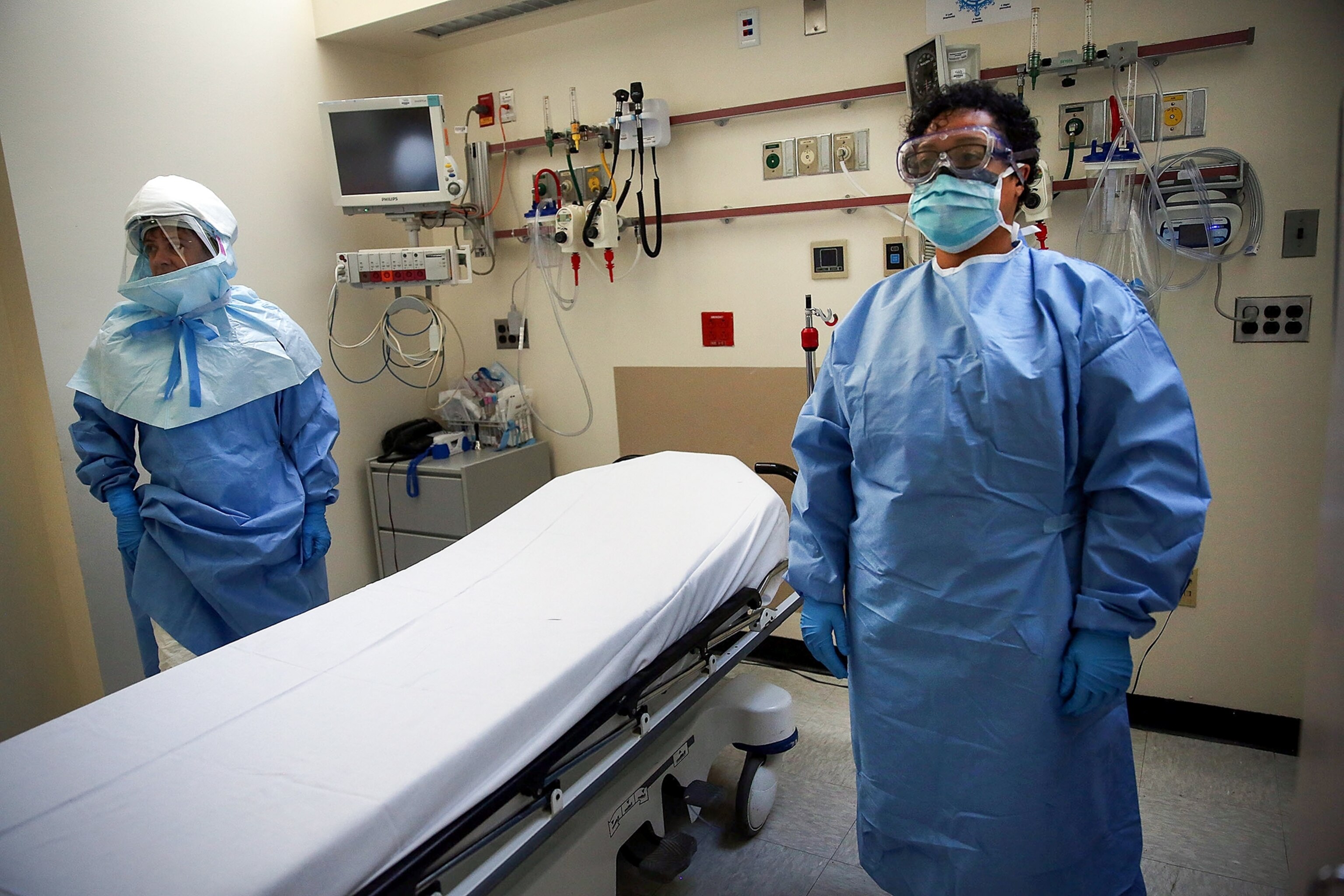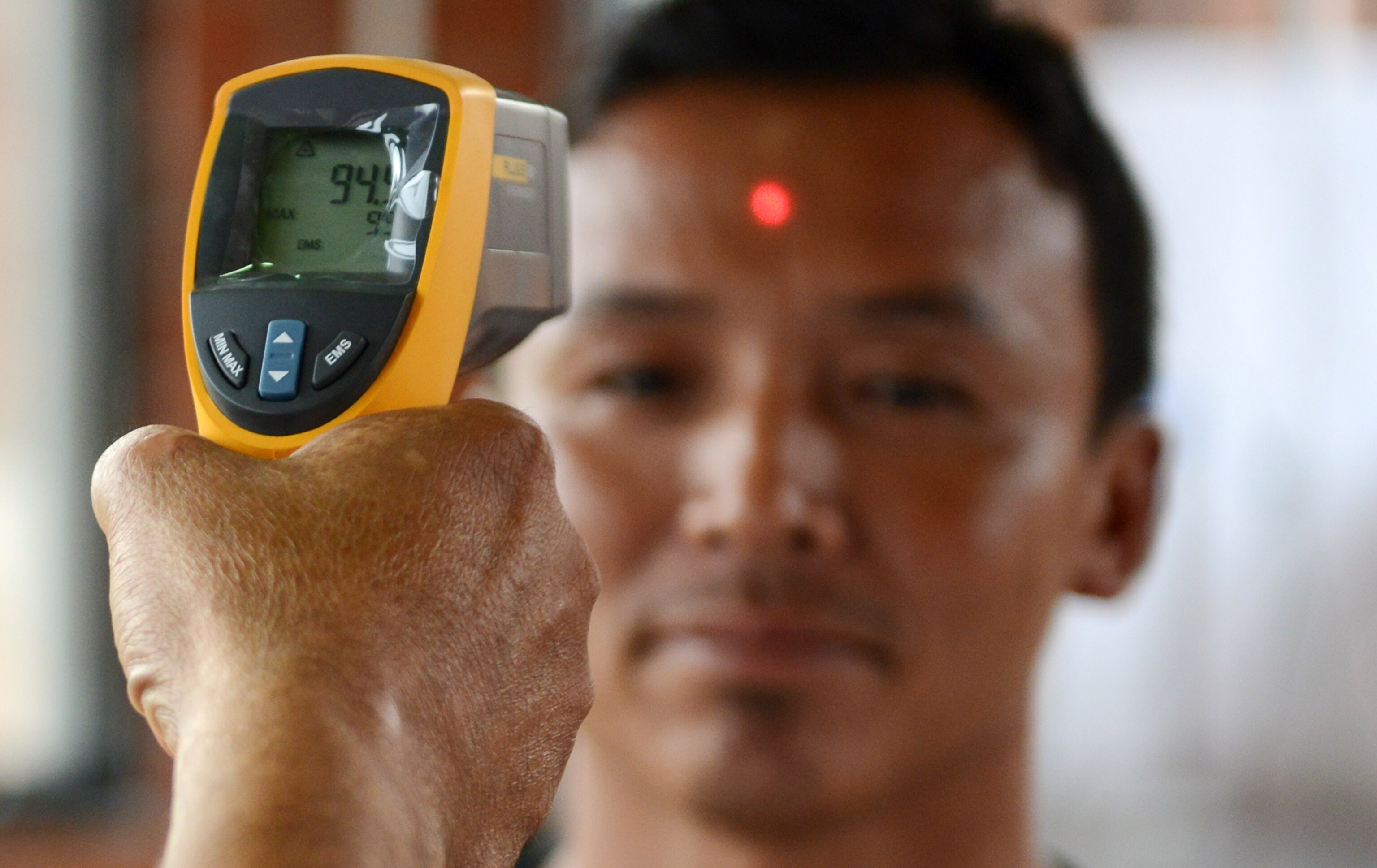
Stepped-Up Airport Screening Reflects Increasing Urgency in U.S. Ebola Response
Move to increase scrutiny of passengers arriving from West African nations comes as patient from Liberia dies in Dallas hospital.
The increasing urgency of efforts to contain the Ebola outbreak in West Africa was evident in the United States on Wednesday, as the U.S. government announced plans to screen air passengers arriving from that region at five of America's busiest airports.
The announcement by the U.S. Centers for Disease Control and Prevention came on a day when Thomas Eric Duncan, a Liberian man who had traveled to the United States for the first time last month and then fallen ill from Ebola, died in a Dallas hospital.
Duncan was the first victim of the Ebola outbreak to die in the United States; nearly 4,000 have died from the disease in West Africa and more than 8,000 there have been infected, according to the World Health Organization. Texas health officials, who are continuing to monitor several adults and children who came into contact with Duncan before he was hospitalized, said Duncan's body will be cremated.
U.S. officials have rejected calls for a travel ban on flights to and from Liberia, Sierra Leone, and Guinea, the nations most affected by the outbreak, saying that a travel ban would complicate efforts to get relief workers and supplies into West Africa's Ebola zone, and limit officials' ability to monitor the spread of the disease. (Related: "Why U.S. Is Reluctant to Issue Travel Ban on Ebola-Stricken West Africa.")
However, the U.S. government's plans for health screenings of air passengers arriving from those West African nations represent an increasingly aggressive containment strategy. The measures will begin Saturday at New York's John F. Kennedy International Airport, the destination of about half of the approximately 150 passengers entering the United States each day from that region.
"We're stepping up protection for people coming into this country and for Americans related to travel," said Thomas Frieden, the CDC's director. "We will continuously look at ways we can increase the safety of Americans."
The enhanced entry screening will begin next week at Washington's Dulles International Airport, Newark Liberty International in New Jersey, Chicago's O'Hare International, and Hartsfield-Jackson International in Atlanta. Together, the five airports receive more than 94 percent of U.S.-bound travelers from Liberia, Sierra Leone, and Guinea, the CDC said in a statement.
Passengers coming through those airports whose itineraries have included those nations will be escorted by Customs and Border Protection agents into a special area for screening.
Trained staff, who will not be wearing protective gear, will observe the passengers for signs of illness, take their temperature, ask a series of questions about their health and possible exposures, and provide information about Ebola. The passengers will be asked to monitor themselves, take their temperature daily for 21 days, and provide health officials with contact information for their time in the United States. If a passenger appears to be ill or may have been exposed to Ebola, he or she will be evaluated by a CDC public health officer and referred to either a local health system or a public health authority, if necessary, Frieden said at a news conference.
No Travel Ban
The U.S. screening is in addition to screenings that are being done in Liberia, Sierra Leone, and Guinea as passengers leave those nations. Those screenings involve taking the passengers' temperature and having them fill out a questionnaire that is designed to determine whether they have been exposed to the Ebola virus.
Since exit screening began in the West African nations two months ago, 77 passengers have been prohibited from flying because of fever or other concerning signs, Frieden said. None of those passengers has turned out to have Ebola.
Frieden Wednesday renewed his criticism of travel bans, saying they would be ineffective at keeping people out of the U.S., but they would discourage aid workers from going into the affected countries. Citing the example of severe acute respiratory syndrome (SARS) a decade ago, he said that travel bans cost the world $40 billion—"not to control the outbreak, but from unnecessary and ineffective travel restrictions and trade changes that could have been avoided."
Frieden emphasized several times Wednesday that Americans will continue to be at risk for Ebola as long as the virus is rampaging through West Africa. "Until this outbreak is over in West Africa, whatever we do can't get the risk to zero here in the interconnected world we live in today." (Related: "Every Newly Emerging Disease Like Ebola Begins With a Mystery.")
Duncan has now become the face most Americans think of when they think about Ebola, Frieden said, but unfortunately, there are thousands of people like him in West Africa who have been sickened or killed by this disease. (Related: "As Ebola Crisis Spreads in West Africa, Liberia's Deterioration Stands Out.")
"We think about this and we remember what a deadly enemy Ebola is, and how important it is that we take every step possible to both protect Americans and stop the outbreak at its source in Africa," he said.

Experts Question Airport Screenings
Duncan, who arrived in the United States on September 20 while carrying the virus, had traveled to visit Louise Troh, with whom he'd reportedly had a son he hadn't seen in 16 years.
Duncan was not showing symptoms of the disease while traveling so authorities believe he was not contagious then, but he may have passed the disease on to others in Dallas. Nearly 50 people in Dallas remain under close observation for signs of the virus, although 38 of them are considered to be at low risk of infection. None has shown symptoms of the disease, which has an incubation period of up to 21 days.
Another person is under observation at Texas Health Presbyterian Hospital—the hospital where Duncan died—after reporting possible exposure to Ebola, the hospital said Wednesday.
"Right now, there are more questions than answers about this case," the hospital said in a statement. "Our professional staff of nurses and doctors is prepared to examine the patient, discuss any findings with appropriate agencies and officials." (Related: "Doctors and Nurses Risk Everything to Fight Ebola in West Africa.")
Frieden said he did not believe the person came into close contact with Duncan or has symptoms indicative of the disease.
When leaving Liberia, Duncan may have lied to airport officials by claiming that he had not been exposed to the virus, government officials there have said. A few days earlier, Duncan had tried to help his landlord's pregnant daughter get to the hospital in Monrovia. She died soon afterward, apparently of Ebola.
The temperature scans at the Monrovia airport would not have stopped Duncan from reaching the United States, but a second interview in the U.S. might have revealed his exposure and flagged the risk before he exposed others. Duncan flew through Washington's Dulles airport en route to Dallas-Fort Worth International Airport, so he would have been subject to the new screenings if they had been in place.
Health specialists on Wednesday said that efforts to stop the spread of deadly viruses at airports historically have not been effective.
Similar measures did not do much to suppress an outbreak of plague in Surat, India, in 1994 or swine flu in Hong Kong in 2009, according to Laurie Garrett, a senior fellow for global health at the Council on Foreign Relations.
"It completely failed," Garrett told USA Today. "You can't stop viruses at airports. It doesn't work."
Aspirin, for instance, can be used to reduce fevers so they can't be detected.
Georgetown University professor Jesse Goodman said no measure is foolproof, but wrote in an e-mail that "it seems wise to up the precautions."
Goodman, former chief scientist for the U.S. Food and Drug Administration and a specialist in infectious diseases, said he thinks the United States should continually reevaluate the effectiveness of the Ebola screening.
"It will be important to assess screening efforts to see if they are helpful or harmful," he said, explaining that some measures could lead people to lie or avoid medical care to evade detection. "Getting this wrong could make things worse."